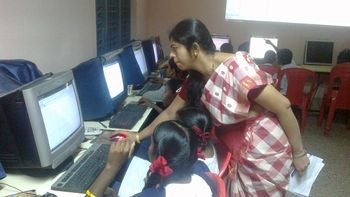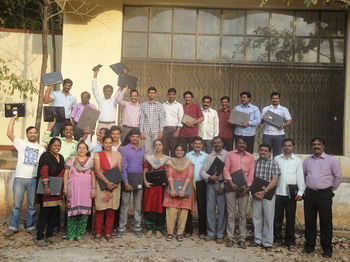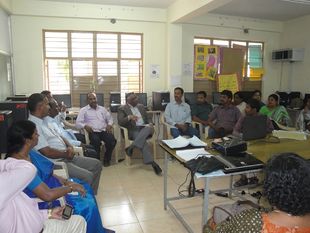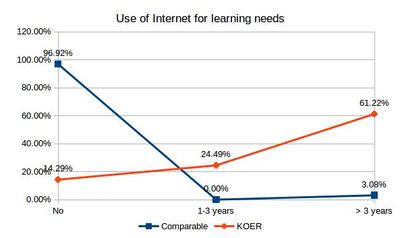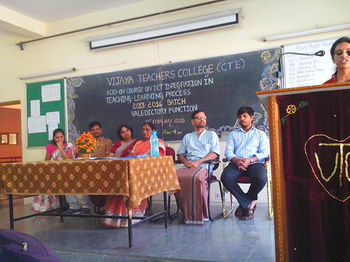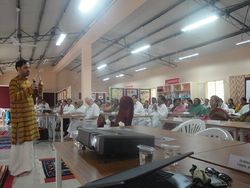Education
From ITfC Annual Report 2014-15
ಇದನ್ನು ಕನ್ನಡದಲ್ಲಿ ನೋಡಿ. 2013-14 Annual Report - Education
It is reassuring to have a committed organisation like ITfC working in the area of Teacher Education, especially when the last decade has seen a worrying dominance of technology providers taking over this space, with an often unabashed commercial motive. ITfC has played a crucial role of mobilizing and guiding academics to step in at significant junctures and advocate for a critical understanding of ICTs in education.
- Anita Rampal, Professor and former Dean, Faculty of Education, Delhi University
Our work in the area of strengthening and reforming of the public education system, is of a long term nature, with continuous incremental work, along the following strands:
Field projects
Strengthening the working of a public education system is a long term engagement; with every year adding insights that help shape the nature and focus of our programme in a continuous, cumulative way. We have a two-pronged approach to our work with the school system. One is an extensive engagement with the state-wide system, trying to institutionalize new approaches to teacher professional development, integrating digital methods. This is through the State level Subject Teacher Forum (STF) and Karnataka Open Educational Resources (KOER) programs, in these we work with teachers and teacher educators. The second is an intensive engagement in a small geography at the micro (school) level, to observe, study and develop processes for school development, integrating digital methods, through the Teachers Communities of Learning (TCOL) program.
Intensive field project in a small geography
As part of this intensive engagement, we started Teachers Communities of Learning (TCOL) program, implemented in partnership with the District Institute of of Education and Training (DIET) of Bengaluru South, Karnataka, covering 17 government high schools across two blocks. The objectives of this programme are to demonstrate a model of ICT integration in school academic and administrative processes and build a community of teachers who collaborate and share ideas, resources and best practices. This is an intensive pilot aimed at developing effective classroom, school and teacher development processes. The program has been able to give us important insights on appropriate ICT infusion practices and has deepened our understanding of how ICTs can support progressive pedagogies in government high schools.
Teachers were able to see a difference, from the intervention; with their transaction approaches moving from covering the syllabus during the year to understanding learner contexts, levels and needs and designing multi-level transactions to cater to varying needs, leading to greater student engagement and learning. The use of digital resources as well as ICT integrated teaching methods helped teachers plan and transact multi-level pedagogies. In addition, teachers across these schools also shared learnings through periodic block level workshops. These workshops were supplemented and complemented by virtual interactions of teachers on the mailing lists as well as mobile phone based groups, to build the block wide community of learning.
Integrating technology in teaching has enhanced learning capabilities of our students. Tools like Geogebra and PhET have made teaching more interactive and more students are participating actively.TCOL workshops have also helped to share resources and experiences among teachers.
-Jayanthi N, Mathematics Teacher, Domlur High School
| "When this group of Class 8 leaves school, let us make sure that they can do something meaningful with their lives", this was the sentiment of the Head Master of Domlur High School. The academic programme being followed by the Mathematics and Kannada teachers is not restricted to the standard syllabus and explores new approaches to integrating materials and methods based on students varying levels of understanding. The intervention in the school involved setting up the ICT lab, training the teachers, developing new methodologies, and digital stories and resources. "Children who do not open their mouth in class now venture to ask questions; we did not know they could do so much work" said the Mathematics teacher; "Reading levels have improved by 25%" said the Kannada teacher. The classes came alive with the digital stories made by the children on the working of nearby community institutions. Jayashree, a Class 8 student with bright eyes and dreams asked,as the year ended "Will you come next year also?". |
At the end of the first year of this 3-year pilot, some important questions have emerged on the levels of exclusion faced by children from urban marginalized sections, the relevance of the standard syllabus and pedagogies emphasizing almost exclusively, formal knowledge systems, the dis-empowerment of the school as an institution to respond to the children and communities it serves. Significant policy and curriculum changes appear necessary for schools to deliver on the promise of social equity. Our work in TCOL over the next two years will focus on strengthening the school as an institution, the teachers as collectives, to develop processes that make for a safe, relevant and responsive school systems.
Extensive state-wide field projects
In-service Teacher Training
Our engagement with the Karnataka education system continued for the fifth year with the Subject Teacher Forum (STF) and Karnataka Open Educational Resources (KOER) programmes, in partnership with the Directorate of School Education, Research and Training(DSERT) and Rashtriya Madhyamika Shiksha Abhiyan(RMSA). The STF aims at empowering teachers for self-directed, continuous, peer-based learning, furthering teacher professional development. The STF teachers are working on collaborative digital resource creation programme, the Karnataka Open Educational Resources (KOER). The aim of focusing on teacher professional development, is also to enable teachers to collectively play a larger role in influencing the direction of the public education system, in which they have largely been marginalised.
The last year saw a deepening of our engagement with Mathematics teachers across the state, to understand ICT integration for both curricular resource creation and peer learning. A subject teacher forum was also established for Kannada language teachers in 1/3 of the state (10 districts) and the Head Teachers Forum was expanded to 6 more districts, this forum now covers half the state. The KOER Program worked with Mathematics, Science and Social Science teachers to help teachers access-create-review-revise-finalize-publish text, audio, visual, simulations, animations and multi-media Open Educational Resources.
| The STF is perhaps the largest professional learning community of teachers belonging to a single system. The forums are emerging as spaces where teachers are taking ownership, self-regulating and moderating interactions. The community is responding to various needs and priorities of the teachers, in terms of classroom resources and materials and many contentious issues are publicly debated. The state wide forum is also spawning off other smaller communities; mobile-based groups for exploring specific topics, or for smaller geographies. The STF aims to cover all Government and aided high school teachers in Karnataka, across subjects and mediums of instruction, which universe is around 6,800 schools, seven mediums of instruction and 12 subjects. During 2015-16, the program will cover remaining Kannada teachers in the state and the Hindi forum will start in 10 districts. The Mathematics KOER program will focus on creating resources for an on-line course on Geogebra and the Science program on developing videos of experiments to encourage teachers to make their labs science active. |
ITfC has brought about a much needed change in teacher education and their work with the education department is a good example of government-NGO partnership. -Prof. Vasanth Bhat, Regional Institute of Education, Mysore. In last years annual report, we had mentioned that the RMSA Joint Review Mission had recommended the STF as a good practice; many state governments have been interested to design similar programs for their teacher development. We began the Telangana Open Educational Resources program in Telangana state and are in discussions with RMSA Assam. |
| STF statistics | |
|---|---|
| Members | 15,000 |
| Schools | 6,000 |
| FOSS educational applications | 15+ |
| emails exchanged | 75,000+ |
| Teachers purchasing laptops | 1000+ |
| KOER statistics | |
|---|---|
| Total web page views | 1.7 million+ |
| Web Pages Created | 7,000+ |
| Resource files uploaded | 4,000+ |
| Pages Edited | 32,000+ |
| Users/ Editors | 538 (teachers) |
The programme's objectives of bringing together teachers shows clear signs of fructifying and the interactions when nurtured will result in a professionally aware group of teachers, willing to and adequately informed to take on their rightful roles of arbitrating the curriculum and schooling processes. - Prof. Rajaram Sharma, CIET, NCERT in a case study on the STF-KOER program, part of a book on OERs for Wawasan Open University, (under publication).
Working with Teacher Educators
Building institutional structures and processes that allow teacher educators to support teachers instead of monitoring and controlling is a necessary shift, which requires significant and serious individual and institutional learning. While we find that Teacher Educators are the most removed from technology integration, supporting such learning through peer networks is critical, and is an important component to making the mainstream teacher education system's work effective. In partnership with DSERT and Commonwealth Educational Media Centre for Asia, (CEMCA), IT for Change (ITfC) conducted capacity building for DIET faculty to train them in various digital tools and methods. This was embedded within the D.Ed syllabus revision programme. The DIET faculty learnt about transact a paper on ICT Mediation in teaching-learning,which ITfC had authored, in workshops that also brought them into the teacher educators community of practice (COP-TE) in the state. The teacher educators who were part of these workshops, in turn conducted similar capacity building program for the pre-service teacher educators in the different districts of the state, through the cascade model; this was perhaps the first attempt in which teacher educators conducted training on ICT integration in teaching-learning.
During 2015-16, the plan is to extend the teacher educators COP-TE to cover two other states in South India, in collaboration with CEMCA and Regional Institute of Education Mysuru (RIE Mysuru)
With support from CEMCA, ITfC strengthened teacher training in Karnataka, and also supported workshops in Delhi, Uttar Pradesh and Himachal Pradesh, to promote ICT integrated teacher education, from 2012-2015, when I was Director at CEMCA. While these resulted in the capacity building of about 350 teacher educators to use open source educational tools, its impact has been transformational – sustaining a network of teacher educators and teachers, and strengthening the Karnataka Open Educational Resources. ITfC’s commitment to find effective solutions to educational problems, and sustaining these through collaboration with governments, communities and national and international organisations is commendable.
-Sanjaya Mishra, Ph.D. Education Specialist, eLearning, Commonwealth of Learning,Canada
Research Projects
ITfC is part of a participatory action research (PAR) to study the processes of collaborative resource creation in KOER, with a core group of teachers, embedded within the larger STF teacher community. The basic hypothesis is “whether and how, a bottom-up approach, where participants collaboratively and actively co-create contextual resources ('embedded' within a 'community of learning'), can support effective OER models”. As a part of this, the study aims to understand the specific structures and processes and technological environments within the community that have been conducive for teachers to access, create, curate and publish (ACCP) educational resources. The PAR seeks to understand if and how such processes ACCP can contribute to the professional development of these teachers and if the resources accessed/created are contextual, that is, relevant to their requirements.
To study these dimensions, we worked with the core group of teachers over three sets of workshops during the year. During these workshops and otherwise through participation in the virtual forums, this core group was introduced to OER processes as well as encouraged to reflect on their participation in these processes. The research processes also included administration of structured questionnaires and focused group discussions with the PAR teachers during the workshops. A similar questionnaire and focused group discussion was also conducted with a 'comparable' group of teachers who were not part of the processes that the PAR group was. The questionnaires aim to collect information on the current technology habits of the teachers, their resource use, adaptation habits as well as their knowledge about OER principles and processes.
Initial analysis suggests that the hypothesis of a bottom up model of resource creation is being borne out; active sharing and seeking of resources on the mailing forum as well as on the repository suggests that teachers are reaching out to their peer community for collaborative learning. Mobile based communities are emerging for resource sharing and creation. The participatory processes are also associated with a significant shift in the teachers use of computers and Internet for their own professional development and for their teaching-learning processes as well(see graph). An interesting insight from our research is teachers' implicit notion of resources to be OERs and not proprietary, as evidenced by their free sharing. The nature of resources shared (in local language and in multiple formats), the communities formed and the interaction possibilities, appear to be able to provide a model for an alternative model of resource creation, that is more participatory and reflective of the local contexts.
Informing Policy and Shaping Discourse
There is little critical research in India on the role of technology in teacher education and its use in classrooms and often technology choices are being made (by governments and private school managements) based on very limited understanding. Shaping current programmes and advocating curriculum and syllabus changes are two important ways of shaping the discourse of ICTs in Education. Thanks to our programmatic work, ITfC is part of state, regional, and national consultations and programmes for curriculum, teacher education and technology.
Education Policy, Curriculum and Teacher Education
This year saw ITfC getting into the curriculum, syllabus design and transaction of various courses on ICT integration for pre and in-service teacher education. Main-streaming our work into the regular teacher education curriculum embeds it into the system, this also established our substantive role in teacher education, beyond the simple imparting of technology skills.
- ITfC designed the curriculum, syllabus, teacher handbook and student source book for the ICT mediation course, for the Karnataka D.Ed programme. ITfC also trained teacher educators to transact the course
- ITfC designed, developed and delivered a course on ICT integration in Education for the B.Ed programme for Vijaya Teachers College, other institutions offering B.Ed. have also evinced interest in a similar course
- ITfC participated as course faculty and mentor on the first Massive Open On-line Course (MOOC) from National Council of Education Research and Training (NCERT) and Commonwealth of Learning (COL) on OERs for teacher educators.
- ITfC was invited to review the ICT in Education course content for students, developed by the Central Institute of Educational Technology (CIET), NCERT
- ITfC participated in the revision of the courses offered for teacher educators and education administrators by the E-Vidya IT Academies in Karnataka.
- ITfC provided inputs to the course on “Enhancing Professional Capacities : Critical Understanding of ICT”, proposed as a part of the two year B.Ed. structure for National Council for Teacher Education (NCTE)
Participation in advisory and review groups
|
We reviewed the ICT program for teacher educators offered by the Arizona State University, at the invitation of MHRD. We advised MHRD that the course unfortunately equated developing an understanding of ICTs and education with acquiring felicity in select proprietary applications. This is a common failure, seeing ICTs as 'tools' rather than the society restructuring force that it is. Handing over the controls of such forces to proprietary vendors, can be quite dangerous, since their model is to establish perpetual rents, from helpless 'consumers', who have no right other than to use the product. |
ITfC helped in the design of the compulsory course “Critical Understanding of ICTs in Education” for the Two-year B.Ed. Course Structure of the National Council of Teacher Education, as well as in the detailed syllabus design of this course for the Two year B.Ed. of Delhi University. Here for the first time an emphasis has been laid on not just enlisting technologies or applications, but on deliberating and engaging with debates especially relevant to the developmental context of India, so that teachers can be empowered to transact this in consonance with the critical pedagogy approach.
-Prof Anita Rampal, Chairperson, NCTE Committee for Two Year B.Ed. program
Advocating for a free and open digital eco-system
Promoting a free and open 'public' digital ecosystem and resisting the huge and powerful pressures from proprietary technology vendors continues to be an important part of our work. While FOSS on the desktop environment has become quite mainstream, with policy support and willingness on part of public institutions to adopt it, the situation in other environments such as the mobile phone space or the Internet search space, or social networking is quite bleak, with the default systems being proprietary. We continued to network with educationists and public institutions on a few issues during the year.
- We organised a letter to Central and State Governments to replace Windows XP, which has been declared obsolete by Microsoft, with a free and open operating system, such as the BOSS GNU/Linux operating system (from CDAC, GoI) or any other GNU/Linux operating system like Ubuntu.
- We organised a letter to Central Government to request that the PSS Central Institute of Vocational Education should withdraw the text books prepared using proprietary office suite and replace them with text books that use FOSS Office suite. This syllabus promotes the commercial interests of the dominant vendors, at the cost of public interest.
- We advocated with NGOs and public academic institutions on adopting FOSS in their work and conducted capacity building programs to help people become comfortable in migrating from proprietary software to FOSS platforms.
"The training which involved presentations and as well as hands on experience of working with the software was a nice way to build in confidence regarding using open source. We look forward to such training programs in the future.
-Seshagiri.Rao.Padaki (Giri), Swami Vivekananda Youth Movement (S.V.Y.M)
Presentations and Media Articles
|
We presented our work at a few events as follows:
|

